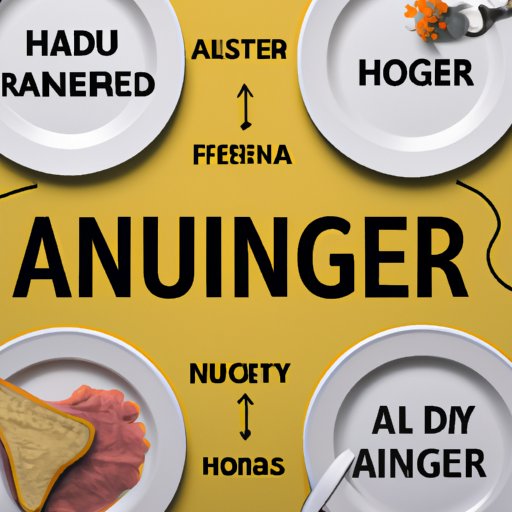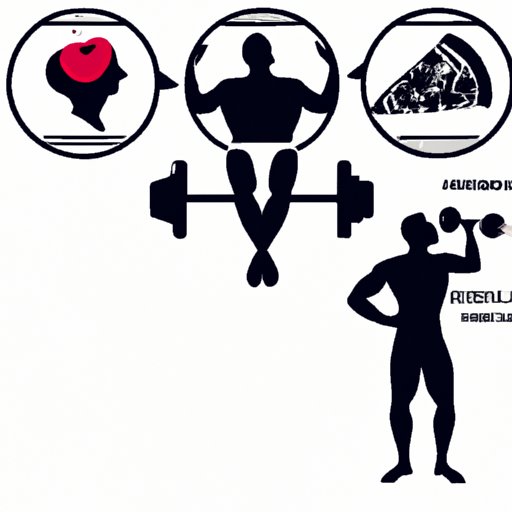Introduction
Working out is an important part of staying healthy and fit. But does it make you hungry? It’s a common question for those who want to improve their health but don’t want to end up eating more than they should. The answer isn’t simple, so let’s take a closer look at the science behind working out and hunger.
Definition of Working Out
Working out can mean different things to different people. Generally speaking, it refers to physical activity that increases your heart rate and makes you sweat. This could include activities such as running, walking, biking, swimming, weightlifting, yoga, or any other form of exercise. The goal of working out is to increase your fitness level, burn calories, and build muscle.

Overview of Hunger and Appetite
Hunger and appetite are two separate concepts. Hunger is the physical sensation of needing food, while appetite is the desire or craving for food. Hunger is regulated by hormones such as ghrelin, which signals the body to consume food, and leptin, which signals the body to stop eating. Appetite is primarily controlled by psychological factors such as emotions, stress, and environment.

Examining the Science Behind Working Out and Hunger
So how does exercise affect our hunger and appetite? Let’s take a closer look at the science behind working out and hunger.
How Exercise Impacts Metabolism and Hunger Hormones
When we work out, our bodies use energy in the form of calories. The number of calories burned depends on the intensity and duration of the exercise. As we burn calories, our metabolism increases, which means our bodies are able to burn more calories even when we’re not exercising. This can lead to an increase in hunger as our bodies need more fuel to keep going.
Exercise also affects hormones related to hunger. During exercise, our bodies release hormones such as cortisol and adrenaline, which can increase appetite. Additionally, certain types of exercise can increase levels of the hormone ghrelin, which is responsible for stimulating hunger.
Understanding the Effects of Exercise on Appetite
Although exercise can cause an increase in appetite, it doesn’t necessarily mean that you will overeat. In fact, research shows that regular physical activity can help reduce cravings for unhealthy foods. Exercise can also increase levels of the hormone leptin, which helps regulate appetite and can lead to decreased cravings.
The Impact of Exercise on Appetite: What Does Research Say?
Research suggests that the impact of exercise on appetite varies from person to person. Some people may find that they are hungrier after exercise, while others may find that their appetite decreases. Let’s take a look at some of the research that has been done on the topic.
Looking at Studies that Examine the Relationship Between Exercise and Appetite
A study published in the International Journal of Sports Nutrition and Exercise Metabolism found that acute bouts of exercise can increase hunger. However, the study also found that this effect was not seen after chronic exercise, suggesting that regular physical activity can help reduce hunger.
Another study published in the journal Appetite examined the impact of aerobic exercise on appetite. The study found that aerobic exercise had a significant effect on appetite, with participants reporting increased hunger after exercise. However, the study also found that the effect was short-term and that appetite returned to normal within an hour.
Exploring the Link Between Exercise and Increased Appetite
It’s important to note that the link between exercise and increased appetite is complex and can vary from person to person. Factors such as the type and intensity of the exercise, as well as individual differences in metabolism and hormone levels, can all affect appetite. Additionally, research suggests that the effect of exercise on appetite can change over time as the body adapts to physical activity.
How to Avoid Overeating After a Workout
Although exercise can increase appetite, there are steps you can take to avoid overeating after a workout. Here are some tips for controlling hunger after a workout.
Eating in Moderation
It’s important to remember that it’s OK to indulge in a snack after a workout, but it’s best to do so in moderation. Aim to eat only enough to satisfy hunger, rather than overeating.
Making Healthy Choices
When choosing snacks and meals after a workout, it’s important to focus on nutrient-dense, whole foods. Foods such as lean proteins, fruits, vegetables, whole grains, and healthy fats are all good choices.
Utilizing Strategies to Control Hunger
There are strategies you can use to manage hunger after a workout. For example, drinking a glass of water or herbal tea before meals can help you feel full faster. Additionally, mindful eating can help you become more aware of your hunger cues and better regulate your appetite.

Strategies to Keep Hunger at Bay After a Workout
In addition to utilizing strategies to control hunger, there are certain nutrients and foods that can help keep hunger at bay after a workout. Here are some tips for curbing hunger after a workout.
Incorporating Protein Into Your Post-Workout Meal
Protein is an important macronutrient for rebuilding and repairing muscle tissue after a workout. Eating foods high in protein after a workout can help keep hunger at bay and prevent overeating. Good sources of protein include lean meats, fish, eggs, beans, nuts, and nut butters.
Eating Regularly
Eating smaller, frequent meals throughout the day can help keep hunger at bay. Eating every three to four hours can help regulate blood sugar levels and prevent overeating.
Staying Hydrated
Staying hydrated is key for keeping hunger at bay. Drinking plenty of water throughout the day can help prevent dehydration and reduce hunger pangs.
Fueling Your Body After Exercise: What You Need to Know
It’s important to fuel your body properly after a workout. Eating the right foods at the right time can help maximize the benefits of exercise and keep hunger at bay. Here are some considerations when picking pre- and post-workout foods.
Considerations When Picking Pre- and Post-Workout Foods
Before a workout, it’s important to eat a balanced meal that contains complex carbohydrates, lean proteins, and healthy fats. This will provide your body with the energy it needs to perform at its best. After a workout, it’s important to replenish your body with nutrients that will help repair muscle tissue and restore energy levels. A post-workout snack should contain a combination of protein and carbohydrates.
Timing Your Meals for Maximum Effect
Timing your meals is also important for maximizing the benefits of exercise. Eating a meal or snack before a workout can help provide energy, while eating within 30 minutes of completing a workout can help restore energy levels and reduce hunger.
Conclusion
Working out can have an impact on hunger and appetite. While exercise can cause an increase in hunger, it doesn’t necessarily mean that you will overeat. By making healthy food choices, utilizing strategies to control hunger, and timing your meals, you can avoid overeating after a workout. With the right approach, you can enjoy the health benefits of exercise without worrying about hunger.
(Note: Is this article not meeting your expectations? Do you have knowledge or insights to share? Unlock new opportunities and expand your reach by joining our authors team. Click Registration to join us and share your expertise with our readers.)
